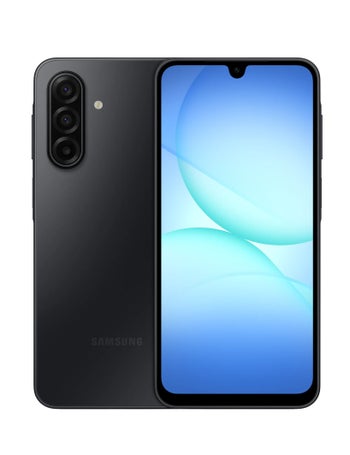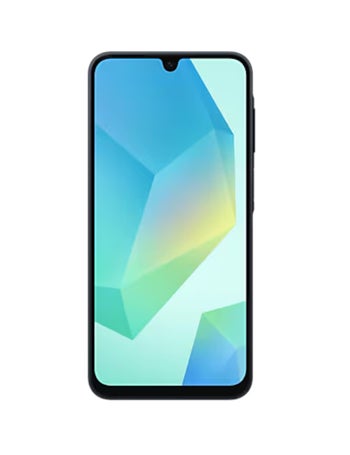Galaxy A17 vs Galaxy A16: Minor upgrades but welcome to the 120Hz party
The Galaxy A17 brings the most affordable Samsung line to the 120 Hz display refresh rate party

Intro
The affordable Samsung Galaxy A16 has been a go-to backup Android phone for many people out there, and for a good reason. This sub-$200 device offers a great display, a decent camera system, and six years of software support, covering the most important smartphone pillars.
Now, Samsung has quietly launched the successor, the Galaxy A17, and it's very interesting to see what upgrades the new model brings to the table. And there are some pretty substantial ones, such as the 120 Hz display refresh rate, which is crazy to see on such a budget phone when the iPhone 16 is still stuck at 60 Hz. But let's not get ahead of ourselves.
Samsung Galaxy A17 vs Galaxy A16 differences:
| Galaxy A17 | Galaxy A16 |
|---|---|
| Similar dimensions and weight, slightly different camera bump | A tad heavier and thicker, camera cutouts similar to the S-series |
| 6.7-inch Super AMOLED display, 120 Hz refresh rate | The same 6.7-inch display, 90 Hz refresh rate |
| FHD+ resolution 800 nits in high brightness mode | FHD+ resolution 800 nits in high brightness mode |
| 50MP+5MP+2MP rear camera system | Same camera setup the main camera lack OIS |
| 13MP selfie camera | The same front camera |
| Exynos 1330 (5 nm), same as previous generation | Exynos 1330 (5 nm) or MediaTek Dimensity 6300 |
| The same memory configurations with up to 8GB RAM | 4GB/128GB, 6GB/128GB, 8GB/128GB, and 8GB/256GB versions |
| Side-mounted capacitive fingerprint scanner | The same fingerprint scanner |
| Battery is the same, 5,000 mAh capacity | 5,000 mAh battery |
| 25W wired charging, still no wireless charging support | 25W wired only charging |
| Android 15, six years of support | Android 14, up to six years of upgrades |
Table of Contents:
Read more:
Design and Size
Going backwards?
The last A-series phones took design cues from the Galaxy S lineup, offering a sleek and stylish look, with the same separate cutout for the cameras on the back pioneered by the Galaxy S Ultra some time ago.
Now, the Galaxy A17 brings a change to the design, going back to an elongated, pill-shaped camera housing, similar to the one Sony has been using on Xperia phones for the past couple of generations.
We don't find the change too appealing, as we were fond of the stylish look of the Galaxy A16, but beauty is in the eye of the beholder. The front of the two phones looks almost identical, with quite a substantial bezel around the screen, a hefty chin, and a teardrop cutout for the selfie camera.
Now, the Galaxy A17 brings a change to the design, going back to an elongated, pill-shaped camera housing, similar to the one Sony has been using on Xperia phones for the past couple of generations.
We don't find the change too appealing, as we were fond of the stylish look of the Galaxy A16, but beauty is in the eye of the beholder. The front of the two phones looks almost identical, with quite a substantial bezel around the screen, a hefty chin, and a teardrop cutout for the selfie camera.
| Galaxy A17 | Galaxy A16 |
|---|---|
| Thickness 7.5 mm | Thickness 7.9 mm |
| Weight 192 grams | Weight 200 grams |
In terms of materials, there are some differences. The Galaxy A16 uses a plastic frame and back and Gorilla Glass Victus over the screen, while the Galaxy A17 is listed with a glass-fiber back material and the same plastic frame and Victus-protected display.
The dimensions are almost identical, but the A17 is 0.4 mm thinner and 8 grams heavier than its successor. This is almost imperceptible when holding the phone in your hand, so for all intents and purposes, these two feel almost exactly the same.
The dimensions are almost identical, but the A17 is 0.4 mm thinner and 8 grams heavier than its successor. This is almost imperceptible when holding the phone in your hand, so for all intents and purposes, these two feel almost exactly the same.
| Galaxy A17 | Galaxy A16 |
|---|---|
| Black | Black |
| Gray | Gray |
| Blue | Light Green |
The color options are pretty similar. The new Galaxy A17 is available in Black, Gray, and Blue, while the previous generation offers Light Green in place of the Blue option.
Display Differences
120Hz for the masses
It's crazy how a $200 phone can get you a 120 Hz refresh rate while Apple still rocks 60 Hz on its premium iPhone 16. But that's the way it is, the Galaxy A17 comes with a 6.7-inch Super AMOLED display that's able to go up to 120 Hz. The resolution is FHD+ (1080 x 2340 pixels) resulting in 358 PPI pixel density. Now, in terms of brightness, the Galaxy A17 still lists 800 nits support in HBM (high brightness mode) but we need some tests to verify this.
| Galaxy A17 | Galaxy A16 |
|---|---|
| Main screen 6.7 inches | Main screen 6.7 inches |
| HBM Brightness 800 nits | HBM Brightness 800 nits |
The Galaxy A16, on the other hand, features a very similar display panel, rocking the same resolution and brightness figures and the same pixel density, and the only difference lies in the refresh rate—it can only go up to 90 Hz. In our display test, the A16 managed 733 nits maximum brightness at 100% APL and 1.6 nits minimum, which is admirable. Stay tuned for lab results soon.
Performance and Software
Exynos ruins the party
The one key area where we found the Galaxy A16 lacking was its chipset. The Exynos 1330 was and still is a very modest chip, and we say "still is" because the Galaxy A17 still features the same silicon. No upgrades in that department, we're afraid.
This octa-core processor managed just below 1000 points in the Geekbench 6 single-core test and around 1900 points in multi-core performance. The 3DMark scores were also not very impressive—360 points. We don't expect the Galaxy A17 to perform radically better, given it uses the same chipset, but we have to run the tests to compare how this silicon performs inside the new phone.
This octa-core processor managed just below 1000 points in the Geekbench 6 single-core test and around 1900 points in multi-core performance. The 3DMark scores were also not very impressive—360 points. We don't expect the Galaxy A17 to perform radically better, given it uses the same chipset, but we have to run the tests to compare how this silicon performs inside the new phone.
| Galaxy A17 | Galaxy A16 |
|---|---|
| Chipset Exynos 1330 5nm | Chipset Exynos 1330 5nm |
| Memory Up to 8GB | Memory Up to 8GB |
| Storage 128GB 256GB | Storage 128GB 256GB |
In terms of RAM, both phones mirror their respective configurations. We have a base 4GB/128GB version, and it goes up from there in 2GB steps. The highest variant features 8GB of RAM and 256GB of storage, bringing both phones into midrange territory.
Camera
Same hardware?
No one expects wonders from a $200 phone, especially when it comes to the camera. But the Galaxy A16 took us by surprise, scoring 124 out of 158 in our composite camera benchmark. The main 50MP camera scored 71 (out of 85), which, all things considered, is a pretty decent score. The selfie camera also performed admirably, with a score of 25 out of 30.
The Galaxy A17 features the same camera system with the same 50MP main camera (this time around supported by optical image stabilization), the same 5MP ultrawide, and the same almost useless 2MP macro camera.
| Galaxy A17 | Galaxy A16 |
|---|---|
| Main camera 50MP | Main camera 50MP |
| Ultrawide 5MP | Ultrawide 5MP |
| Macro 2MP | Macro 2MP |
| Selfie 13MP | Selfie 13MP |
It will be interesting to see whether or not Samsung has tweaked the image processing algorithms to improve the camera quality or left everything untouched on the Galaxy A17 compared to the previous model. We're doing the review as we type this, so stay tuned for a side-by-side sample comparison soon.
Battery Life and Charging
No changes
In the battery department, there are no changes whatsoever. For all intents and purposes, the Galaxy A17 and its predecessor should be viewed as the same phone. At least when it comes to battery and charging.
Now, the 5,000 mAh battery and the Exynos 1330 aren't the best pair when it comes to efficiency; the A16 was able to get 6 h 12 m on a single charge in our composite battery test, which ranks it 101st among phones tested in the past 2 years. Given the modest power and the beefy battery, we expected more. The test will tell us if Samsung has improved the situation on the Galaxy A17.
Now, the 5,000 mAh battery and the Exynos 1330 aren't the best pair when it comes to efficiency; the A16 was able to get 6 h 12 m on a single charge in our composite battery test, which ranks it 101st among phones tested in the past 2 years. Given the modest power and the beefy battery, we expected more. The test will tell us if Samsung has improved the situation on the Galaxy A17.
| Galaxy A17 | Galaxy A16 |
|---|---|
| Battery 5,000mAh | Battery 5,000mAh |
| Wired charging 25W | Wired charging 25W |
| Wireless charging No wireless support | Wireless charging No wireless support |
The same goes for charging—both phones cap at 25W wired and don't support any wireless charging. It's a slow charging speed by any standard, and the A16 took 1 h 43 m to fully charge, which, in a world where a midrange Motorola can charge in half an hour, is just not fast enough.
Specs Comparison
Here's how the Galaxy A17 vs Galaxy A16 compare. Head to the link for a detailed specs comparison.
|
|
|
| Samsung Galaxy A17 5G | Samsung Galaxy A16 5G |
| Dimensions | |
|---|---|
| 164.4 x 77.9 x 7.5 mm | 164.4 x 77.9 x 7.9 mm (~9.2 mm with camera bump) |
| Weight | |
| 192.0 g | 200.0 g |
| Size | |
|---|---|
| 6.7-inch | 6.7-inch |
| Type | |
| Super AMOLED, 90Hz | Super AMOLED, 90Hz |
| System chip | |
|---|---|
| Exynos 1330 S5E8535 (5 nm) | Exynos 1330 (5 nm) |
| Memory | |
| 8GB/128GB 8GB/256GB | 4GB (LPDDR4X)/128GB (UFS 2.2) 8GB/256GB |
| Type | |
|---|---|
| 5000 mAh | 5000 mAh |
| Charge speed | |
| Wired: 25.0W | Wired: 25.0W |
| Main camera | |
|---|---|
| 50 MP (OIS, PDAF) Aperture size: F1.8 Sensor size: 1/2.76" Pixel size: 0.64 μm | 50 MP (Autofocus) Aperture size: F1.8 Sensor size: 1/2.76" Pixel size: 0.64 μm |
| Second camera | |
| 5 MP (Ultra-wide) Aperture size: F2.2 Sensor size: 1/5" | 5 MP (Ultra-wide) Aperture size: F2.2 Sensor size: 1/5" Pixel size: 1.12 μm |
| Third camera | |
| 2 MP (Macro) Aperture size: F2.4 | 2 MP (Macro) Aperture size: F2.4 |
| Front | |
| 13 MP | 13 MP |
See the full
Samsung Galaxy A17 5G vs Samsung Galaxy A16 5G specs comparison
or compare them to other phones using our
Phone Comparison tool
Summary
We're planning on doing a full review of the Galaxy A17, so this comparison will soon be populated by benchmarks, display tests, and camera samples. But even at this point we can draw some conclusions.
The Galaxy A17 is largely the same phone as its predecessor, except for a few minor updates. The 6.7-inch screen can now refresh with up to 120 Hz, while the previous model was capped at 90 Hz. There's a slight design change concerning the camera housing, and the A17 is a tad lighter and thinner.
There's a case to be made for the software situation. Both phones offer up to six years of major Android updates, which is amazing for this budget segment, but the Galaxy A17 will outlive its predecessor by one year, being newer.
Now, if you're looking for a budget phone or a backup phone, the Galaxy A-series and both the A17 and A16 in particular are decent options. The phone is on pre-order for 239 euros right now (we expect US availability and pricing soon), and for that kind of money, it's a bargain.
There's no need to upgrade if you already own the Galaxy A16, as the differences are miniscule. We'll update this comparison with all the benchmark results once we finish the review of the Galaxy A17.
The Galaxy A17 is largely the same phone as its predecessor, except for a few minor updates. The 6.7-inch screen can now refresh with up to 120 Hz, while the previous model was capped at 90 Hz. There's a slight design change concerning the camera housing, and the A17 is a tad lighter and thinner.
Now, if you're looking for a budget phone or a backup phone, the Galaxy A-series and both the A17 and A16 in particular are decent options. The phone is on pre-order for 239 euros right now (we expect US availability and pricing soon), and for that kind of money, it's a bargain.
There's no need to upgrade if you already own the Galaxy A16, as the differences are miniscule. We'll update this comparison with all the benchmark results once we finish the review of the Galaxy A17.
Follow us on Google News





















Things that are NOT allowed:
To help keep our community safe and free from spam, we apply temporary limits to newly created accounts: